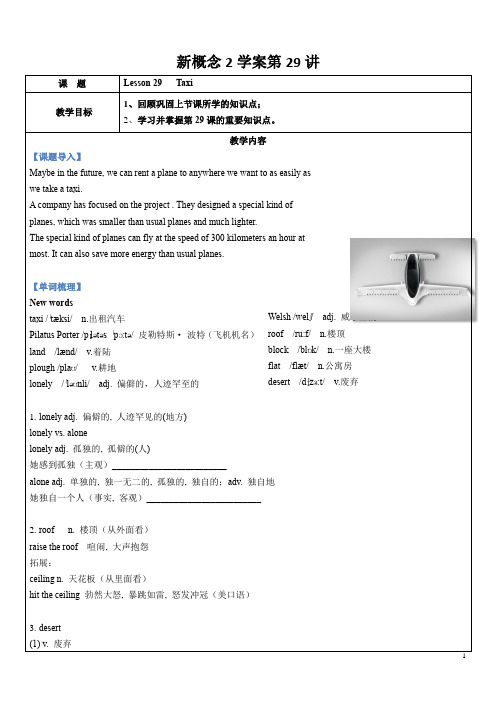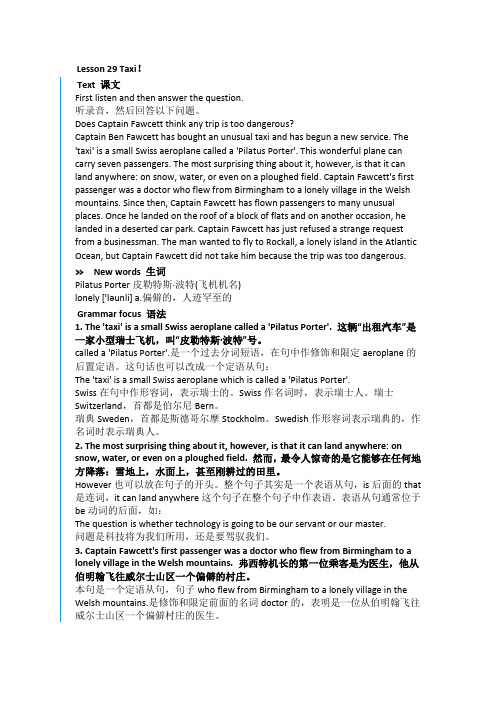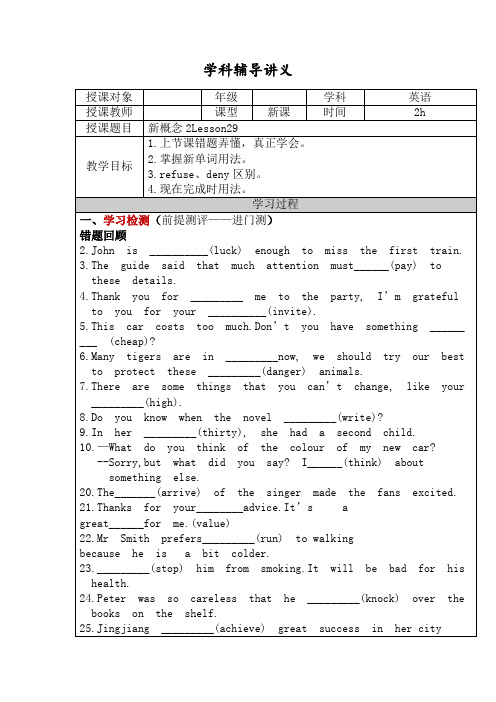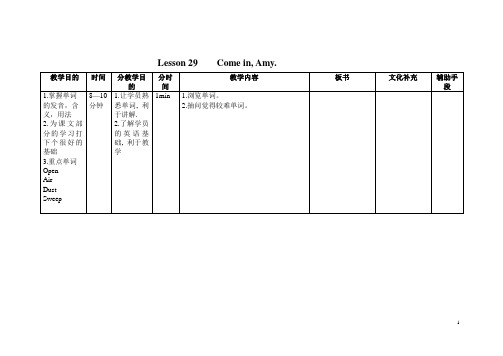新概念29课教案
新概念2-Lesson29 讲义

Welsh /wel ʃ/ adj. 威尔士的 roof /ru:f/ n.楼顶 block /bl ɒk/ n.一座大楼 flat /flæt/ n.公寓房 desert /d ɪ'z ɜ:t/ v.废弃新概念2学案第29讲课 题 Lesson 29 Taxi教学目标1、回顾巩固上节课所学的知识点;2、学习并掌握第29课的重要知识点。
教学内容【课题导入】Maybe in the future, we can rent a plane to anywhere we want to as easily as we take a taxi.A company has focused on the project . They designed a special kind of planes, which was smaller than usual planes and much lighter.The special kind of planes can fly at the speed of 300 kilometers an hour at most. It can also save more energy than usual planes.【单词梳理】 New wordstaxi /ˈtæksi/ n.出租汽车Pilatus Porter /p ɪl ət əs ˈp ɔ:t ə/ 皮勒特斯· 波特(飞机机名) land /lænd/ v.着陆 plough /pla ʊ/ v.耕地lonely /ˈl əʊnli/ adj. 偏僻的,人迹罕至的1. lonely adj. 偏僻的, 人迹罕见的(地方) lonely vs. alonelonely adj. 孤独的, 孤僻的(人)她感到孤独(主观)_________________________alone adj. 单独的, 独一无二的, 孤独的, 独自的;adv. 独自地 她独自一个人(事实, 客观)_________________________2. roof n. 楼顶(从外面看) raise the roof 喧闹, 大声抱怨 拓展:ceiling n. 天花板(从里面看)hit the ceiling 勃然大怒, 暴跳如雷, 怒发冲冠(美口语) 3. desert (1) v. 废弃—Oh, I am sorry. I __________(not know) that.8. They usually __________(go) fishing when they lived there.9. How long __________ she __________(be) ill?10. They didn’t start to work in the field until the rain __________(stop).二、单项选择( )1.Mother____me a new coat yesterday.I_______it on already .It fits me well.A.had made; have triedB.made; have triedC.has made; triedD.made; tried( )2.--He____to draw horses already”.--When______he?-- Last year.A.learned; hasB.learned; didC.has learned; hasD.has learned; did( )3.Tom_____up into the tree.Look,he____high up there!A.has got; isB.has climbed; wasC.got; wasD.climbed; is( )4.____you_____the text yet?Yes,we____it two hours ago.A.Did; copy; didB.Have; copied; haveC.Have; copied; didD.Did; copy; had( )5.______you__________the film before?Where_____you____it?A.Have; seen…did; seeB.Did; see; did; watchC.Have; seen; have; seenD.Did; see; have; seen( )6.You____me waiting for two hours.I____for you since five.A.kept; waitedB.have kept; waitedC.kept; have waitedD.have kept; have waited【课文回顾】✧Has Captain Ben Fawcett bought a small Swiss acroplane, or has he bought an ordinary taxi? Does he use it as ataxi or not? (and)✧What is it called?✧How many passengers can it carry? Can it land anywhere or not? (not only ... but)✧Has Captain Fawcett taken passengers to many strange places in his plane or not?✧Did he refuse to fly a businessman to Rockall or not?✧Was the journey too dangerous or not?_____________ Ben Fawcett has bought_____________ and has begun a new_____________. The 'taxi' is a small _____________ _____________called a 'Pilatus Porter'. This wonderful plane can carry seven passengers. The most surprising thing about it, however, is that it can _____________anywhere: on snow, water, or even on a _____________ field. Captain Fawcett's first passenger was a doctor who flew from Birmingham to a lonely village inthe Welsh mountains._____________, Captain Fawcett has flown passengers to many unusual places. Once he landed _____________ a block of _____________ and on another _____________, he landed in a _____________ car park. Captain Fawcett has just _____________ a strange_____________ from a businessman. The man wanted to fly to Rockall, a lonely_____________ in the Atlantic Ocean, but Captain Fawcett did not take him because the trip was too _____________.【等你来挑战】一、用所给单词的正确形式填空。
新概念英语第二册Lesson29教案资料

新概念英语第二册L e s s o n29Lesson 29 Taxi 【Word】1 taxi['tæksi] n.出租汽车2 Pilatus Porter皮勒特斯·波特(飞机机名)3 land[lænd] v.着陆4 plough[plau] v.耕地5 lonely['ləunli] a.偏僻的,人迹罕至的6 Welsh[welʃ] a.威尔士的7 roof[ru:f] n.楼顶8 block[blɔk] n.一座大楼9 flat[flæt] n.公寓房10 desert ['dezət] v.废弃【Text】Captain Ben Fawcett has bought an unusual taxi and has begun a new service. The 'taxi' is a small Swiss aeroplane called a 'Pilatus Porter'. This wonderful plane can carry seven passengers. The most surprising thing about it, however, is that it can land anywhere: on snow, water, or even on a ploughed field. Captain Fawcett's first passenger was a doctor who flew from Birmingham to a lonely village in the Welsh mountains. Since then, Captain Fawcett has flown passengers to many unusual places. Once he landed on the roof of a block of flats and on another occasion, he landed in a deserted car park. Captain Fawcett has just refused a strange request from a businessman. The man wanted to fly to Rockall, a lonely island in the Atlantic Ocean, but Captain Fawcett did not take him because the trip was too dangerous.【Useful Expressions】★taxi n. 出租汽车taxi driver 出租车司机take a taxi, take a bus, take a lift★land vi. 着陆Whose plane landed in the field?★plough v. 耕地plough n. 梨;v. 耕,犁,犁耕,费力穿过,艰苦前进,在考试中淘汰farm n. 农田,家场★lonely adj. 偏僻的, 人迹罕见的(地方)lonely adj. 孤独的,孤僻的(人)She felt lonely. 她感到孤独(主观)alone adj. 单独的,独一无二的,孤独的,独自的;adv. 独自地She is alone. 她独自一个人(事实, 客观)★roof n. 楼顶(从外面看)raise the roof v. 喧闹,大声抱怨ceiling n. 天花板(从里面看)hit the ceiling 勃然大怒,暴跳如雷,怒发冲冠(美口语)★block n. 块, 一座大楼★flat n. 公寓房a block of flats 公寓楼 (英国英语)a block of apartments 公寓楼(美语,apartment n. 公寓)office block 办公楼写字楼★desert v. 废弃① v. 废弃desert the house = let the room empty② n. 沙漠, 不毛之地★Refuse and Denyrefuse to do sth. 拒绝做某事I offered to pay him for his help but he refused (payment).deny doing sth. / deny that +从句否认(指控、做过某事等)The secretary denies that she has stolen the letter.当refuse作为及物/不及物动词表示“拒绝接受”时,不可与deny混用;当refuse作为及物动词表示“拒绝给予、拒绝要求”时,它与deny可以互相替换。
新概念英语第二册lesson29教学案

Lesson 29 Teaching and learning material----by SadieStep1: Revision ( a dictation)Step2: Proverbs learning1.活到老,学到老。
2.覆水难收。
3.先学走,再学跑。
4.过去的就让它过去吧。
5.别惹麻烦。
Step3: Oral English practiceTalk about the experience of your first flightStep4: Listening (two times)Lesson29 Taxi! 出租汽车!Captain Ben Fawcett has bought an ___________ taxi and has begun a new service. The 'taxi' is a small Swiss _________ called a 'Pilatus Porter'. This wonderful plane can carry seven passengers. The most __________ thing about it, however, is that it can ________ anywhere: on snow, water, or even on a ploughed field. Captain Fawcett's first passenger was a doctor who _________ from Birmingham to a lonely village in the Welsh mountains. Since then, Captain Fawcett has flown passengers to many unusual places. Once he landed on the roof of a block of flats and on another ___________, he landed in a _________ car park. Captain Fawcett has just refused a strange request from a __________. The man wanted to fly to Rockall, a lonely island in the Atlantic Ocean, but Captain Fawcett did not take him because the trip was too _____________.Step5: W ords and phrases一辆不寻常的出租车开始一项新业务(飞机)降落在雪地上一个偏僻的村庄从那时起(用飞机)载客一栋公寓楼一个废弃的停车场一个奇怪的请求在另一场合,另一次Step6: learning and teaching1. He has just bought a new house. He has been in it for _____ a short time. (1. since,2. about,3. for,4. ago)2. There is always a car outside his gate. ______ he can’t get into his garage. (1. For this, 2. Because,3. Because of,4. That’s why)3. It is one of the ugliest faces I have ever seen. I’ve never seen ________. (1. an ugly one, 2. an ugliest one, 3. the ugliest one.4. an uglier one.)4. ______ of them has been turned to stone. (选2个:1. No one, 2. Not one, 3. Not, 4.None,5. Even one,6. Not a one,7. Either)5. It’s an unusual taxi. It isn’t very_____ (1. accustomed,2. common,3. usually)6. The ploughed field is for下种.(1. sowing, 2. sewing, 3. seeding, 4. planting)7. It’s a lonely village. Here “lonely” mean ____( 1. alone, 2. the only one, 3. far form anywhere, 4. far.)8. The car park was desert. It was ____ (1. a desert, 2. empty,3. abandoned)9. He is a rear person. Y ou _____ meet such people. (1. seldom, 2. never)10. Y ou can see some _____ outside his gate. (1. labels, 2. notices, 3. signals, 4. notes)11. The signs hasn’t had any effects. They hasn’t _____ anyone. (1. affected, 2. effected, 3. resulted, 4. had any effects on)12. The signs hasn’t had any effects. They_____ (1. are no effect, 2. are of no effect, 3. effected no affect,4. without effect)13. “What is it?” I asked. I asked him what ______14. Captain Feweett’s first passenger was a doctor. The doctor flew from Birmingham to a lonely village.(本句有二个doctor,如何连成一句)15. Did you meet him in l982? Yes,I did,but I____ 1982.(从1982年以来未见过他)16. She meet him in 1964, but she hasn’t met him _____ (1. then, 2. since, 3. than, 4. since then)17. I saw him three years ago. I haven’t seen him _____ three years. (1. since, 2. for, 3. at, 4. from)18. I have never been abroad _______(1. before, 2. ago, 3.Before, 4. then)19. I have been here an hour.(改错)20. I have never seen such ugly man before. 改错I have never seen such a people before.改错21. I did not see him since last month. 改错I haven’t seen him since two days. 改错22. It’s two years since I meet you last.It’s two years since I had met you last. 选对的23. believe in我一向主张心胸要开阔。
新概念青少版_2B_Unit_29教案

Pattern practice
• A: Did Paul and Dan run fast ? A: Did Tom and John jump high? 一般过去式变为一般疑问句的三要素 一调二改三问号 课本111页改写句子
Homework
1.听MP3复习P106_110 2.做出新单词及音标卡片 3.记要听写的单词
前几天
更远
锦标赛
明确地
个人记录
输掉
绘画
竞争对手
根据汉语说出英 文.
Pronunciation 语音
/v/ vase very village
driver event invite
/w/ we west wheel
wine worse always
过去时态:发生在过去的动词,要把动词变成过去式
动词原形 is are do win jump come break near fast high far good
fast [fɑ:st] (adj. 形容词) 快的 Look! I am running fast!
Time flies! Please save time!
an hour
60 minutes
3600 seconds
second ['sekənd](n. 名词) 秒
minute [‘minit] (n.名词) 分(钟) hour. • 运动员
• 锦标赛
• 竞争对手 秒 赢 厘米
• 更远
• 打破 个人记录 跳高
• 跳远
athlete ['æ θli:t] (n.名词) 运动员
Which athlete do you like?
hurdle
新概念英语第二册-Lesson29教学文案

This wonderful plane can carry seven passengers. The most surprising thing about it, however, is that it can land anywhere: on snow, water, or even on a p那lo木ug桥h承ed得f住ie这ld样. 重的卡车吗?
since then 强调起点 so far/up to now 强调终点
on several occasion on rare occasions
Jenny is a naughty girl, once she broke Anna's nose and on another occasion, she broke Tina's teeth.
2. 2. What is the most surprising thing about this “taxi”?
The most surprising thing about it is that it can land anywhere.
3. 3.Why has Captain Fawcett refused to fly a businessman to Rockall?
(人名)
We call it an unusual taxi because it can
land anywhere
v. 着陆
Questions: 1. Why does the writer say Captain Ben
Fawcett’s taxi is unusual? Because the 'taxi' is a small Swiss aeroplane called a 'Pilatus Porter' .
新概念英语第二册29课Taxi教案.doc

新概念英语第二册29课Taxi教案.docMini-lesson Teaching Plan Lesson 29 Taxi!Fan WenhuiTeaching materials:A story about “taxi”.Teaching objectives:1Using scanning skills to find some places.2 Understanding the story about”taxi”and repeating the story. Main Teaching skills to be trained:1 Scanning skills.2 Organizing skills.3 Direction skills.Teaching aids:Some pictures from website:1 Different vehicles in world.2 Airplanes in world.Teaching procedures:Step I Oral English practice(3')T: Today, we'll read a short passage “taxi “to learn a story.( Teaching skills: Organizing skills, Direction skills.) Now, ,boys and girls talking about your experience of first flight .Just think about it and talk with your partner ,then I will ask someone to practice.(Allow them some time to talk,then ask 1 student to practice.) S1: (Raising hands and standing up) I want to tell your my first experience of airplane.When the plane took off, I felt it was shaking.But I was not nervous because of excitement. After a while, it stopped shaking and flied higher. I could see the buildings onthe ground.They became smaller and smaller. And finally, I couldn't see them anymore. Through the window, I could see the blue sky. It was very clear. Clouds were under the plane. They looked so different from the ground. It was amazing.1T: OK, very good! Sit down, please.It’s a good experience. Step II Listening practice(6'.two times)T:OK,boys and girls, we will listen to a text,please listen carefully.You have to fill the blanks.Captain Ben Fawcett has bought an _ taxi and has begun a new service. The 'taxi' is a small Swiss _ called a 'Pilatus Porter'. This wonderful plane can carry seven passengers. The most _thing about it, however, is that it can _ anywhere: on snow, water, or even on a ploughed field.Captain Fawcett's first passenger was a doctor who _from Birmingham to a lonely village in the Welsh mountains. Since then, Captain Fawcett has flown passengers to many unusual places. Once he landed on the roof of a block of flats and on another _, he landed in a _ car park. Captain Fawcett has just refused a strange request from a _. The man wanted to fly to Rockall, a lonely island in the Atlantic Ocean, but Captain Fawcett did not take him because the trip was too _.T:I will ask 4 students come to the blackboard to write their answers.And ask 2 students to repeat the story.Step III Deep understanding(5')T: All right now. Time is up. Have you all understood the passage?(Ensure the majority of the Ss have understood the passage.) Listen carefully, boys and girls. This time I will ask you to find some words in the text you have not know after your read textagain.(Give students time to read the text and find words.Teacher will give direction and add some words.)a.★taxi n. 出租汽车taxi driver 出租车司机take a taxi/take a bus/take a liftWhose plane landed in the fieldb.★Pilatus Porterc.★land v. 着陆d.★plough v. 耕地plough .n. 梨farm 农田e.★lonely adj. 偏僻的,人迹罕见的lonely (人) 孤独的/cold fishShe felt lonely 感到,主观She is alone. 事实,客观Home alonef.★Welsh adj.g.★roof n. 楼顶ceiling 天花板raise the roof v. 喧闹,大声抱怨hit the ceiling [美口] 勃然大怒,暴跳如雷h.★block n. 块,一座大楼a block of flats 公寓楼office block 办公楼i.★flat n. 公寓房apartment 公寓a block of apartmentsj.★desert v. 废弃desert the house = let the room emptydesert .n. 沙漠Step IV Phrase learning1. call sb sth(Teacher explain it.)The instrument was called a clavichord.be called 被称为called 在此句中为过去分词过去分词做定语时是作为被动状态来翻译的,ing表示正在I have an instrument. The instrument is called a clavichord.I have an instrument called a clavichord.I have a cat called Lucy.2. from ... to ... 从...到...(Ask students to make sentence.)fly sb to... 开飞机送某人去on another occasion 还有一次(eg:Once I met him on the street and on another occasion I met him)in the library.在图书馆request from 来自某人的请求request for sth. 要求得到take sb to school 送某人上学refuse to do sth 拒绝做某事deny doing 否认做某事3.too 在副词或形容词前表示否定含义(Emphasize it)very 强调程度深too 强调程度大到了人们不愿去做You are very kind.very expensive 买得起too expensive 买不起T:After class students find different cars in the world and tell me.Everyone has a good time,bye bye.September 4, 2013.。
新概念第二册第29课教案

Lesson 29 Taxi!
Listen and answer
1. 2. 3. Why does the writer say Captain Ben Fawcett’s taxi is unusual? What is the most surprising thing about this “taxi”? Why has Captain Fawcett refused to fly a businessman to that lonely island in the Atlantic Ocean?
Captain Fawcett has just refused a strange request from a businessman.
refuse sb. sth. refuse to do sth. request from sb. 来自某人的请求 request for sth. 要求得到
一般过去时 VS 现在完成时
Exercise
Once he landed on the roof of a block of flats and on another occasion, he landed in a deserted car park.
roof n. 楼顶 block n. 一座大楼 flat n. 公寓房 = apartment a block of flatrted car park 被废弃的停车场
Captain Fawcett’s first passenger was a doctor who flew from Birmingham to a lonely village in the Welsh mountains. lonely adj. 偏僻的,人迹罕至的 Eg: a lonely village She felt lonely after her parents had passed away. alone 表语形容词 The man was alone in the town. lone 定语形容词 In that cloudy sky only one lone star can be seen.
新概念第三册29课教案

Lesson 29 Funny or not 是否可笑?I. New words and expression 生词和短语a. Largely adv.在很大程度上-- His success was largely due to luck.b. Universal adj.普遍的universal agent n.全权代理人;universal time n.(= Greenwich Time)世界时间,格林尼治时universal joint n.[机]万向接头万向接头:一种接头或连轴节,能使互相不在一条线上的机械零件在传输旋转运动时在任意方向上具有有限的运动自由度。
Universality n.普遍性, 一般性, 多方面性, 广泛性Universally adv.普遍地, 全体地, 到处It’s universally acknowledged(adj.公认的) that English is get more and more important.Universe n.宇宙, 世界, 万物c. Comic adj.喜剧的, 可笑的;Comedian n.滑稽演员, 喜剧演员;Comedy n.喜剧, 喜剧性的事情-- Tragic adj.悲惨的, 悲剧的;-- Tragedy n.悲剧, 惨案, 悲惨, 灾难-- Tragedian n.悲剧演员, 悲剧作家d. Distasteful adj。
avastefully)Unpleasant adj.使人不愉快的, 讨厌的Displeasing adj.使人不愉快的, 令人发火的-- The idea is distasteful to me.e. Pester v.一再要求, 纠缠(assail vt.攻击, 困扰)pester sb. to do sth. 以某事烦扰某人; 缠住某人讨取某物; 麻烦某人做某事pester sb. with sth. 以某事烦扰某人; 缠住某人讨取某物; 麻烦某人做某事-- He continually pesters his boss with demands.pester sb. for sth. 以某事烦扰某人; 缠住某人讨取某物; 麻烦某人做某事-- Don’t pester me for the trifle.(n.小事, 琐事, 微不足道的东西)f. Dread v.惧怕;Dread + 名词, 动名词, 动词不定式-- We were dreading his arrival. 我们正担心他来呢!-- He dreaded having to meet his parents.-- I dread to think what will happen if he finds out.Dreadful adj.令人恐惧的, 令人不快的;-- a dreadful disaster 可怕的灾难dreaded adj.感到恐惧的;in dread of…. 害怕某人[某事]-- We are in dread of insects.(insect n.昆虫)terrify vt.使恐怖, 恐吓horrify v.使恐怖, 使极度厌恶, 惊骇fear v.害怕, 畏惧, 为...担心g. Grief n.悲痛, 伤心事, 不幸, 忧伤He is consoling his friend in grief for the loss of child.h. hobble v.瘸着腿走-- I hurt my foot while getting off the bus, and had to hobble home.我在下公共汽车时脚受了伤, 只好一拐一拐地走回家。
新概念第一册29课教案

新概念第一册29课教案教案标题:《新概念第一册29课教案》一、教学目标:1. 知识目标:学习并掌握《新概念英语第一册》第29课的词汇、语法和句子结构。
2. 技能目标:通过训练,提高学生的听、说、读、写的能力,培养他们的英语交流能力。
3. 情感目标:培养学生的自信心,激发学习英语的兴趣和热情。
二、教学重点:1. 掌握关于童年的词汇和短语,如"childhood," "in one's early teens," "carefree,"等等。
2. 理解并正确使用本课所学的句型结构,如"used to do something."三、教学难点:理解并正确运用"used to do something"在过去经常发生的动作或状态的表达方式。
四、教学准备:1. 课本《新概念英语第一册》第29课的教材及相关教学资源。
2. 多媒体设备、录音机等教学辅助工具。
五、教学过程:1. 热身活动(5分钟):学生与教师进行简单的问答,回顾上一课所学的内容,引发学生兴趣。
2. 导入新课(10分钟):通过图片展示和提问,引导学生概括出本课的主题和内容。
3. 理解课文(20分钟):a. 教师播放录音,学生跟读。
b. 教师逐句解释课文中的生词和短语,并进行相关练习。
c. 学生分组讨论课文中出现的关键词汇和短语,并进行小组展示。
4. 语法讲解(15分钟):a. 教师引导学生理解和掌握"used to do something"的用法及句型结构。
b. 教师通过例句和练习,帮助学生熟练运用该句型进行表达。
5. 听力训练(10分钟):a. 师生共同听录音并回答相关问题。
b. 学生进行听力练习,根据录音内容填写相关信息。
6. 读写训练(15分钟):a. 学生分组进行口语练习,模仿课文中的对话进行对话练习。
b. 学生进行书面练习,根据课文内容写一篇短文,描述他们自己的童年生活。
新概念英语Lesson29-30(共8页)课件

the wardrobe. • MRS. JONES: Then make the bed. • MRS. JONES: Dust the dressing table.
课文解析
• e in ,Amy. 进来,艾米! • ★祈使句:省略了主语“you”动词用原
形。 • 用来表示直接的命令,建议,告戒或邀请
等多种意图。 • e.g.: Stand up! • Sit down! • Give me some glasses,please. • Harry up ,shut the door! • Open the window and air the room. • Go away!
• 该句仍为祈使句。 • put sth. Somehwhere句型 • put the apple in my bag • put money in my bag • put the stone in your bag • put the computer in my room • put the T.V. in my room • put the dust bin in your room
• 2.What must I do? 我必须做些什么呢? • 这是本课所学的含有情态动词的特殊疑问
句。 • 其结构为:特殊疑问词+情态动词+主语+
谓语?
• What must I do?
• What must he do?
• What must they do?
• 3.Then put these clothes in the wardrobe. 然后把这些衣服放在衣柜里。
新概念英语第一册29课备课讲稿

A Then make the bed. B Dust the dressing table. C Open the window and air the room. D Then sweep the floor. E Then put these clothes in the wardrobe.
祈使句,省略主语"you",动词原形开头, 用于表示命令、请求、劝告、警告、禁 止等
Shut the door, please.
MRS.JONES: shut the door , please.
祈使句,省略主语"you",动词原形开头, 用于表示命令、请求、劝告、警告、禁 止等
the door,名词,做shut的宾语。
新概念英语第一册29课
This bedroom is very tidy.
bedroom
Lead-in:
bedroom This bedroom is very untidy.
Lesson 29 Come in,Amy!
New words and expressions:
shut [ʃʌt] V. 关门
形容词做表语
What must I do, Mrs. Joneபைடு நூலகம்?
What must I do,Mrs. Jones?
感受两个句子的语气:你吃饭。 你必须吃饭。
哪个句子让人感觉有命令的语气?
哪个词增加了动词吃的情态语气? must 像这样增加动词情态语气的词就叫情态助动词
must情态动词“必须”,后接动词原形
bedroom['bedrʊm] n.卧室
untidy [ʌn'taɪdɪ] adj.乱,不整齐
新概念第二册第29课教案.docx

Lesson 29 TaxiGood afternoon boys and girls・ I am your new English teacher. It is my pleasure to be here to help you improve your English and to study with you. My Chinese name is Wang Rui. My English name is Belinda. Now would you please tell me your Chinese and English name one by one .................OK, now let's begin our class.Today we are going to study Lesson 29.Please turn to the page of 138.Firstly, Let's look at new words and expressionsJust read after me....(每个单词读两遍)(开始对单词进行逐一讲解)1 > taxi: taxi driver出租车司机(边写板书边提醒大家记笔记)bus driver公交车司机(提出词组的过程中跟学生互动)造句互动:“出租车司机工作很辛苦”“他是一个公交车司机”(每抛出一个词组之前,都要用问问题的方式与孩子互动时刻吸引他们的注意)take a taxi; take a bus2、P ilatus Porter是课文中出现的飞机的名字•…3、L and在课文中以动词的形式出现的,意思是“着陆”造句互动:“这架飞机在着陆在IU野里” This plane lands in the fieldland (n.)陆地、大地、土地一motherland祖国、故乡造句互动:“我热爱我的祖国”4、P lough: a ploughed field 耕过的地5、L onely:重点讲解区别lonely & alone (重要知识点要反复强调)Lonely:形容“地方”:偏僻的,人迹罕至的形容“人”:孤独的,孤僻的互动:人迹罕至的海滩a lonely beach(此处要跟学生强调通过词组记单词的意思会更牢固)一个孤单的老人a lonely old manalone (adj/adv) adj.单独的,孤独的adv.独自地从词性上我们能看出来这两个词的第一个不同点••…(ask students)没错,就是alone可以用做adv,而lonely不口J以,现在我们來用副词alone造一个句:“她独自回家去了” She went home alone o接卜来,我们来看alone作为adj 的时候,这两个词的区别。
新概念英语第二册Lesson29Taxi!讲义

Lesson 29 Taxi!Text 课文First listen and then answer the question.听录音,然后回答以下问题。
Does Captain Fawcett think any trip is too dangerous?Captain Ben Fawcett has bought an unusual taxi and has begun a new service. The 'taxi' is a small Swiss aeroplane called a 'Pilatus Porter'. This wonderful plane can carry seven passengers. The most surprising thing about it, however, is that it can land anywhere: on snow, water, or even on a ploughed field. Captain Fawcett's first passenger was a doctor who flew from Birmingham to a lonely village in the Welsh mountains. Since then, Captain Fawcett has flown passengers to many unusual places. Once he landed on the roof of a block of flats and on another occasion, he landed in a deserted car park. Captain Fawcett has just refused a strange request from a businessman. The man wanted to fly to Rockall, a lonely island in the Atlantic Ocean, but Captain Fawcett did not take him because the trip was too dangerous.New words 生词Pilatus Porter皮勒特斯·波特(飞机机名)lonely ['ləunli] a.偏僻的,人迹罕至的Grammar focus 语法1. The 'taxi' is a small Swiss aeroplane called a 'Pilatus Porter'. 这辆“出租汽车”是一家小型瑞士飞机,叫“皮勒特斯·波特”号。
新概念第二册lesson29教案

these details.
4.Thank you for _________ me to the party, I’m grateful to you for your __________(invite).
raise the roof v.喧闹,大声抱怨
ceilingБайду номын сангаасn.天花板(从里面看)
hit the ceiling勃然大怒,暴跳如雷,怒发冲冠(美口语)
★block n.块,一座大楼
★flat n.公寓房
a block of flats公寓楼(英国英语)
a block of apartments公寓楼(美语,apartment n.公寓)
5.This car costs too much.Don’t you have something ______ ___ (cheap)?
6.Many tigers are in _________now, we should try our best to protect these _________(danger) animals.
21.Thanks for your________advice.It’s a great______for me.(value)
22.Mr Smith prefers_________(run) to walking because he is a bit colder.
23._________(stop) him from smoking.It will be bad for his health.
farm n.农田,家场
Lessson29 新概念 教案

air the kitchen
air the washroom
掌握正确读音,用法
3mins
3mins
Dust v.掸掉灰尘
第一层次:发音
通过领读和跟读确保单词的正确发音。
第二层次:含义
掸掉灰尘
第三层次:操练
T:掸掉桌子上的灰尘
S:dust the table
T:掸掉橱柜上的灰尘
S: You must turn off the light .
T:你必须穿上外套。
S: You must put on the coat.
T:你必须把瓶子倒空。
S: You must empty the bottle.
T:你必须把这些刀子磨锋利。
S: You must sharpen these knives.
2.抽问觉得较难单词。
1.掌握正确的单词发音用法
3mins
Open v.打开
第一层次:发音
通过领读和跟读确保单词的正确发音。
第二层次:含义
打开
第三层次:操练
T:开门
S: open the door
T:开窗
S: open the window
T:打开书
S: open the book
T:打开我的手提包
通过领读和跟读确保单词的正确发音。
第二层次:含义
扫
补充:
拖mop
第三层次:操练
T:扫地
S: sweep the floor
T:扫卧室
S: sweep the bedroom
T:扫客厅
S: sweep the living room
T:扫厨房
新概念29课教案

新概念29课教案第一篇:新概念29课教案Lesson 29Come in, Amy?一、教学重点1、new words and expressions2、passage3、grammar二、教学难点1、总结:用祈使语气来表示直接的命令、建议、告诫、邀请等多种意图。
2、句型:-What must I do?三、课前准备电脑音频教案 PPT 单词卡片四、教学步骤:1、greeting2、warm up(play a game)3、revision4、提问:How must Amy clean the floor ?5、生词解读,纠正发音(详见New words and expressions)。
6、精讲课文,板书和笔记(详见下文)。
7、再听一遍音频,逐句跟读。
8、总结本课重点句型。
9、布置作业:背诵单词、练习卷一张五、引入话题:当你要求别人把门打开的时候应该怎么说呢?You open the door.这种句子中我们通常可以把you省略掉。
变成Open the door.这就是我们今天要讲的祈使句。
六、【New words and expressions】★untidy adj.乱,不整齐un-前缀,表示否定;tidy adj.整齐的,干净的happy——unhappy 不幸福的 lucky——unlucky 不幸的 known——unknown 未知的★open v.打开turn on 打开★airv.使… 通风,换换空气① n.空气,新鲜空气Let’s go out and breathe some fresh air.② n.空中,空间He likes to stay in the open air.他喜欢在户外呆着。
③ v.晾(衣服、被褥等);使通风Leave the trousers on the washing-line to air.把裤子挂到晾衣绳上去晾干。
★sweepv.用笤帚扫地 dust① v.掸掉……上的灰尘;② n.灰尘 clear adj.清晰的v.清除 cleanadj.清洁的,干净的v.使……干净(不管用什么方法)cleanse v.用水彻底把……弄干净 wipev.用抹布去擦七、[Grammar] 情态动词:情态动词表示人的情感、状态或情绪变化的一种助动词,它本身具有实际意义。
- 1、下载文档前请自行甄别文档内容的完整性,平台不提供额外的编辑、内容补充、找答案等附加服务。
- 2、"仅部分预览"的文档,不可在线预览部分如存在完整性等问题,可反馈申请退款(可完整预览的文档不适用该条件!)。
- 3、如文档侵犯您的权益,请联系客服反馈,我们会尽快为您处理(人工客服工作时间:9:00-18:30)。
Lesson 29 Come in, Amy?
一、教学重点
1、new words and expressions
2、passage
3、grammar
二、教学难点
1、总结:用祈使语气来表示直接的命令、建议、告诫、邀请等多种
意图。
2、句型:- What must I do?
三、课前准备
电脑音频教案PPT 单词卡片
四、教学步骤:
1、greeting
2、warm up (play a game)
3、revision
4、提问:How must Amy clean the floor ?
5、生词解读,纠正发音
(详见New words and expressions)。
6、精讲课文,板书和笔记(详见下文)。
7、再听一遍音频,逐句跟读。
8、总结本课重点句型。
9、布置作业:背诵单词、练习卷一张
五、引入话题:
当你要求别人把门打开的时候应该怎么说呢?You open the door. 这种句子中我们通常可以把you省略掉。
变成Open the door. 这就是我们今天要讲的祈使句。
六、【New words and expressions】
★untidy adj. 乱,不整齐
un-前缀,表示否定;tidy adj. 整齐的,干净的
happy——unhappy 不幸福的
lucky——unlucky 不幸的
known——unknown 未知的
★open v.打开turn on 打开
★air v. 使… 通风,换换空气
① n. 空气,新鲜空气
Let’s go out and breathe some fresh air.
② n. 空中,空间
He likes to stay in the open air. 他喜欢在户外呆着。
③ v. 晾(衣服、被褥等);使通风
Leave the trousers on the washing-line to air.
把裤子挂到晾衣绳上去晾干。
★sweep v. 用笤帚扫地
dust ① v. 掸掉……上的灰尘;② n. 灰尘
clear adj. 清晰的v. 清除
clean adj. 清洁的,干净的v. 使……干净(不管用什么方法)cleanse v. 用水彻底把……弄干净
wipe v. 用抹布去擦
七、[Grammar]
情态动词:
1 情态动词表示人的情感、状态或情绪变化的一种助动词,它本身具有实际意义。
2 情态动词不能单独做谓语,只能和后面的原形动词一起构成谓语。
3 情态动词没有人称和数格的变化。
4 含有情态动词的句子,否定句在它后面加not,一般疑问句把它提前。
情态动词must的用法:
must是情态动词,表示“必须”、“应当”,与have to相似,表示不可逃避的义务。
在说话人看来,没有选择的余地。
但must带有个
人色彩,表示说话人的主观意图。
表示个人感情时通常用must。
You must…(你必须……)表示说话人说/认为……是必要的。
You must open the window.
You mustn't open the window?
Must I open the window?
Yes, you must.
No, you needn't.
八、grammar practice
can must
九、Summary
1、new words
2、passage
3、grammar
十、Homework。
